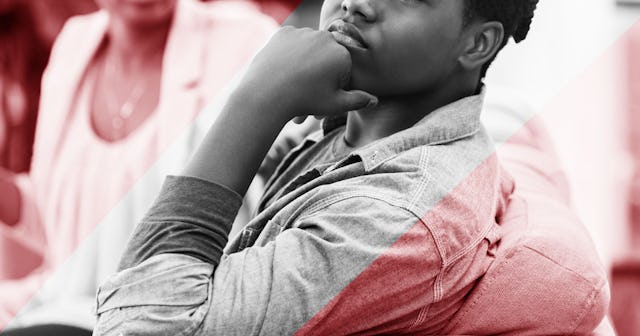I Realized Why My Teen Acts Awful Around Me (But Great Around Others)

“He was so helpful today, we got so much done,” my aunt said of my oldest son when I recruited him to help her and her husband move. This was nice to hear because at home he’d been a royal pain in my ass. The truth was, I would have told him he needed to help them regardless, but lately he’d been pressing every button I had (in additional to finding new ones) and I needed some time and space away from him.
If I said anything to him, he interrupted me in a crass tone. If I asked him about his day, I got a shoulder shrug instead of actual words. If I told him I needed help, he fought me on every little request. If I said “up,” he said “down” just for the hell of it.
I was exhausted and trying to get back the relationship I used to have with my son when he was tiny, sweet, and wanted to please me. This new version — the one where he was allergic to listening to me and hated being around me — wasn’t working very well for either of us.
I thought it was his fault because he was being a jerk. He thought it was my fault because I expected him to be “perfect.”
I couldn’t help but notice, as soon as we were around friends or family, my beloved son would return to his old self. He was respectful, he would answer questions, he was able to pull it together for everyone else except for me. And I hated it.
One evening as we were driving home from a party — a party where we’d had a great time lighting sparklers, admiring fireflies, and eating fire-roasted hot dogs — I put my hand on is shoulder as we drove home. After a few seconds, he pulled away rolling his eyes.
“Why are you nice to everyone but me,” I asked slapping my hand back on the wheel dramatically. “What did I do that was so awful?”
“I’m tired, Mom,” was all I got in return. Within a few minutes, he was asleep.
I’d had such a lovely evening, but my son’s looming bad attitude weighed on me. Lately, it had been tainting everything from simple family dinners to his relationship with his siblings. They could see I was spending more time and energy trying to keep him calm and happy because it could ruin my day in under two seconds.
Then, I remembered something: When my father-in-law was suffering from cancer, he wife broke down in front of her sisters and me saying, “Why is he so horrible to me, then when someone comes to visit him, he’s so cheery and happy?”
She was sobbing in her hands at the kitchen table, tears dripping onto the floral table cloth. Her sister patted her head and said, “Because he knows he can be his true self with you, he doesn’t have to act. He’s going through something horrible right now and he needs to be able to express himself around someone he knows is going to stick by him.”
AntonioGuillem/Getty
That incident at the kitchen table happened before I became a mother, and until that night in the quiet car with my son, I’d forgotten all about it. But as I drove, it hit me in the right place.
Suddenly, it all made sense. My son held it together for his friends. He was able to keep the mask on in front of family or when we were in public. But around me, he needed to be able to express some of what he was going through and he felt safe enough to do that.
This realization didn’t make me love the way my son was acting any more. I still want to teach my kids there is a certain way you treat people, but I was able to understand a bit better. Once I understood, it took the pressure off our relationship and I no longer felt such a strong need to get him to treat me as he treated everyone else every moment of every day.
Being a child, at any age, can be hard and confusing. It’s easy for us to tell them how good they have it and they should smarten up and treat us with respect at all times, but they don’t have anything else to measure their life thus far against.
We all need a safe person, and a safe place to let it all out and to be ourselves and that’s exactly what my son doing — being himself in his safe place. And I’m happy to be that for him.
And, the truth is, he can pull it together when he needs to. I get compliments about his behavior and how helpful he can be all the time, and that tells a lot about the boy I’ve raised.
So, when he reluctantly takes out the trash after I ask him and tells me I “make him do everything,” I’ll remind myself of all the times people have told me that I have raised a good son and that it’s a privilege to be someone’s “safe place.” After I take many cleansing deep breaths, of course.